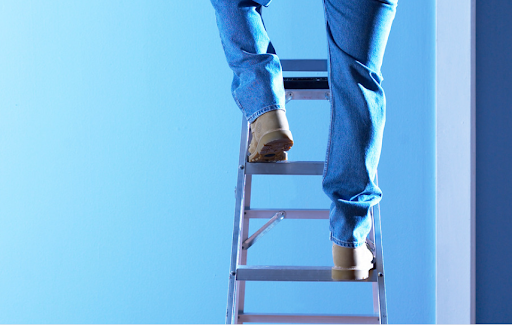Ladders come in lots of different sizes and styles but when it comes to the material that your ladder is made from, which ladder is better – aluminium or fibreglass? The answer simply comes down to the job at hand and who is using the ladder.
To decide whether aluminium or fibreglass ladders are better, you must know how and where the ladder will be used. In short, aluminium ladders are better if you won’t be working around electricity or fire but fibreglass ladders are better if you are working in these environments because it’s a non-conductive material that will not lead to electrocution in these hazardous working conditions.
Aluminium ladders are perfect for general home maintenance, construction and industrial use where workers need to reach higher heights, but fibreglass ladders are ideal for smaller jobs like hedge trimming or decorating due to their heavier weight. Fibreglass ladders are also a 100% necessity when working with or near power lines or electrical wires as the material doesn’t conduct electricity and isn’t damaged by heat.
Get Help With Ladders
Ladders are a staple tool for all tradespeople, homeowners and DIYers. Ensuring that you choose the right type of ladder for the job in hand will ensure your safety and efficiency of work when tackling your next high-level task.
BPS Access Solutions supply a huge range of ladders, scaffolding and staging to the trade and individuals. From loft ladders, tripod, roof, stairs, industrial ladders and step ladders, plus many more, if you need a quality aluminium or fibreglass ladder at an affordable price, with next day delivery and a lifetime guarantee – then BPS can help.
All products are rigorously tested, meeting all necessary safety regulations and featuring full, clear use instructions and guidelines, meaning it doesn’t matter if you’re an experienced user or you’re just buying your first ladder, we can help you get the job done safely.
View full range and Shop Ladders
Read on as we compare the workhorses of aluminium and fibreglass ladders in more detail so that you can make an informed decision on which to buy for your needs.
How To Choose The Right Ladder
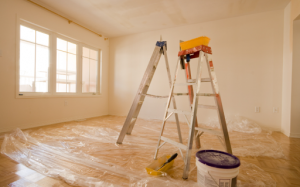
The first step to choosing the right ladder is to consider the job that you have in mind and where you will be using the ladder. Most ladders will be made of either aluminium or fibreglass, and both materials offer pros and cons that make them better suited to support the rigours of different tasks and environments.
Choosing the right ladder for you will therefore depend on how and where you intend to use your ladder.
For example, an extendable roof ladder needs to be lightweight so aluminium is best, whereas a step ladder in the home can be used for a variety of jobs, including electrical checks, and doesn’t need to be so light as it will rarely be moved, which means fibreglass would be the best option here.
An electrical contractor working near electricity pylons would have to choose a fibreglass ladder to protect themselves from electrocution as fibreglass doesn’t conduct electricity and is resistant to fire, unlike aluminium.
As well as the material of the ladder, the type of job that you need the ladder for will impact its size, height, weight and construction, which is why the job you’re doing is the first thing to consider when choosing the right ladder for your needs.
What Difference Does The Material Make?
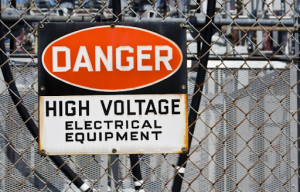
Choosing the right material for your ladder is an important consideration that can impact your safety when working at height and in certain conditions such as with electricity or dangerous chemicals.
Fibreglass is useful for jobs that involve electricity as the fibreglass will not conduct electricity like other metals. This means the user remains safe from electrical shocks caused by electricity being conducted through the ladder they are using. An aluminium ladder on the other hand is a good idea for most other jobs.
What Are Aluminium Ladders Good For?
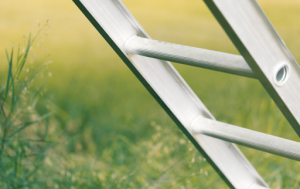
Aluminium ladders are the most common type of ladders used in homes and building sites around the UK. As aluminium ladders are light, affordable and durable, they are an excellent choice for the majority of DIYers and tradesmen delivering a wide range of jobs.
Benefits of Aluminium Ladders
- Lightweight, making them easy to transport
- Durable and last for years
- Easy to set up, take down and move
- Doesn’t rust or corrode when exposed to moisture
Downsides to Aluminium ladders
- Aluminium is highly conductive meaning it can’t be used for electrical work
- Aluminium conducts heat very well, so if your ladder is subjected to very hot temperatures or fire, it should be replaced as the structure and strength may have been compromised.
Aluminium ladders come in all shapes and sizes and can be used for a wide variety of tasks. These aluminium industrial swing back builders’ steps are tested and certified to the latest EN131 professional standard so you can be confident they are built to last. They come with a 150kg weight rating, are available in 7 different sizes and have plenty of safety features making them the perfect piece of kit for any tradesperson or DIY enthusiast.
What Are Fibreglass Ladders Good For?
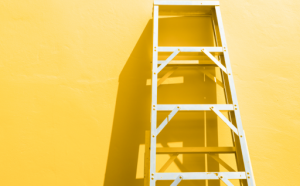
Fibreglass ladders are typically used by tradespeople that will be working in dangerous areas with live electricity such as around power lines and areas with a high fire risk. As fibreglass ladders are resistant to electricity and high levels of heat, they are an excellent choice for reducing the risk of working near live electricity and fire hazards, and just like aluminium can be used for a wide variety of tasks.
Benefits of fibreglass ladders
- Safety properties in dangerous environments with fire and electrical risk
- Fibreglass doesn’t conduct electricity or heat so its integrity will not be damaged and you will not need to replace the ladder if subjected to these environments
- Durable and last for years
- Easy to set up, take down and move
- Doesn’t rust or corrode when exposed to moisture
- Can be used for all kinds of jobs, not just electrical work
Downsides to fibreglass ladders
- Fibreglass is more expensive than aluminium ladders due to its non-conductive properties
- Fibreglass is heavier than aluminium ladders so can be harder to carry around by one person if used to make larger ladders.
Fibreglass ladders come in all shapes and sizes and can be used for a wide variety of tasks. This fibreglass platform step ladder is perfect for all types of DIY/Trade work. Certified to the latest EN131 Professional standard, it holds 150kg and is non-conductive to 30,000 volts, meaning it is suitable for all electrical jobs and other tasks. Available in 8 different sizes and comes with a variety of safety features and optional additional accessories.
How Does The Height And Weight Compare?
While both fibreglass and aluminium ladders can in theory be made to any height, the denser properties of fibreglass mean that it is heavier than aluminium. As a result, the higher you make a fibreglass ladder, the more it will weigh, which in turn means it will be more difficult to handle, especially when working alone.
For this reason, fibreglass is typically used for step ladders or smaller ladders and aluminium is used for straight and full-length extension ladders and mobile platform ladders which require easier manoeuvrability.
Which Is Stronger?
Both fibreglass and aluminium ladders are strong and can support varying weights depending on the size, model and style of the ladder being used.
- Fibreglass and aluminium ladders come in various sizes and styles capable of supporting heavy loads but you should pay attention to the ladder-type to determine the weight capacity for your ladder.
- Styles of ladder include; portable stepladders, step stools, stair ladders, extension ladders, trestle ladders, sectional ladders, combination ladders, single ladders, platform ladders, and more.
- Ladder types in the UK include; Class 1, Class EN131 and Class III. Each classification indicates the safe working load that a ladder is designed to support.
- Class 1 ladders have a duty rating of 130kg, and a maximum load of 175kg and are suitable for industrial use.
- Class EN131 ladders have a duty rating of 115kg, a maximum load of 150kg and are suitable for commercial use
- Class 111 ladders have a duty rating of 95kg, and a maximum load of 125kg and are suitable for domestic use.
It’s important to know a ladder’s weight limit as it will provide peace of mind that the user of the ladder will be fully supported and provide guidance on how many additional bits of equipment or protective clothing can be carried on the ladder too without exceeding the maximum recommended weight limit.
There is no correction between ladder size and weight capacity, so a longer ladder will not necessarily have a higher weight capacity and you should always check the sticker on the side of your ladder to check the weight limit before using it.
Which Will Last Longer?
How long your fibreglass or aluminium ladder will last will largely depend on how you store it and treat it when using it, but the different properties of fibreglass and aluminium do play a role in how long your ladder will last.
As fibreglass boasts superior weather resistant qualities, it is likely to be more durable and longer-lasting than aluminium in the long run. Fibreglass can be left in the sun or rain for extended periods without rusting or losing its strength. Aluminium doesn’t rust, but it does corrode which means it can become unstable if not kept out of the elements when not in use.
Related Questions
How To Safely Use A Ladder
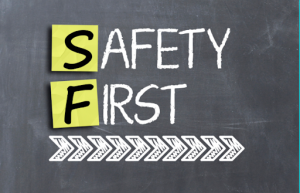
Whichever material your ladder is made from, you should ensure that you inspect it carefully before use to ensure it is in a workable condition without any weak spots that could affect its ability to remain stable or hold the intended weight load.
Here are some simple safety checks to conduct before using your fibreglass or aluminium ladder:
- Look for damage or missing parts
- Check for loose or missing bolts or rivets
- Inspect your ladder feet for excessive wear
- Make sure ropes are not fraying and that they are securely attached
- Check that ladder stiles/rungs/treads are straight
- Ensure spreaders are in good order
- Look out for dust, water, grease, and corrosion on your ladder
- Clean the ladder with mild soapy water and dry it thoroughly before use
- Store your ladder in a dry, covered location when you are finished with it
- Watch out for splits, rot, and insect infestation on timber ladders
Summary
When asking which ladder is better – aluminium vs fibreglass, it’s important to consider the job that you’re doing, who will be using the ladder and the environment that the ladder will be used in.
Knowing these key things will help you to determine which ladder material is best suited to your needs. Both aluminium and fibreglass ladders are strong, robust and come in a variety of ladder styles but they do lend themselves to different types of work due to their ability to perform in environments that include live electricity.
Aluminium ladders are lightweight but strong so are great for the majority of jobs around the house, on building sites or in industries that require workers to work at height. In contrast, fibreglass ladders tend to be heavier so are better suited to smaller jobs such as painting, hedge trimming or home repairs and are also an essential option when dealing with power lines or electrical wires because they do not conduct electricity.
In short, aluminium ladders are better if you won’t be working around electricity or fire but fibreglass ladders are better if you are working in these environments because it’s a non-conductive material that will not lead to electrocution in these hazardous working conditions.
Buying A New Ladder?
If you’re looking to purchase a new ladder or to replace or upgrade your existing ladder, BPS Access Solutions stock a wide range of fibreglass and aluminium ladders for every job.
Here at BPS Access Solutions, we have over 10 years experience supplying British tradespeople and members of the public with the highest quality height access equipment. Just head over to the online store to browse the ladders available by style, material and job to ensure you find the right tool for the task in hand or contact the friendly customer services team for more information.
No related posts.


